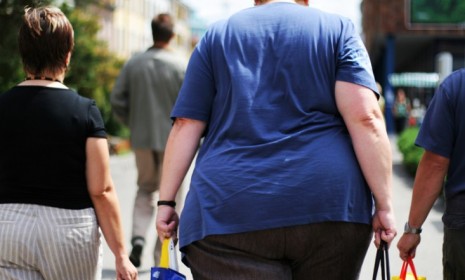Are we underestimating how fat Americans are?
A new study suggests that many people who are classified as overweight are actually obese — and face health risks they didn't even know about

A free daily email with the biggest news stories of the day – and the best features from TheWeek.com
You are now subscribed
Your newsletter sign-up was successful
It's no secret that America has a bit of a weight problem. The most recent statistics say 35.8 percent of Americans are overweight, while 35.7 percent are obese. But a new study published in the journal PLoS One suggests that those estimates are wrong, and that we may be severely underestimating how many of us are obese. Is the obesity epidemic actually worse than we thought? Here, a brief guide:
How did the researchers determine how fat we really are?
Doctors normally look at body mass index, or BMI, for a quick indication of whether a patient is obese. (Calculate your BMI, which is a ratio of height to weight, here.) But the problem with BMI, researchers say, is the measure only gives a general sense of your weight; BMI doesn't account for how much of the weight is muscle and how much is fat. The new study, led by Dr. Eric Braverman, went a step further, and measured the percentage of body fat in 1,400 men and women using a dual-energy X-ray absorptiometry (DEXA) scan capable of providing a breakdown of bone, fat, and muscle mass.
The Week
Escape your echo chamber. Get the facts behind the news, plus analysis from multiple perspectives.

Sign up for The Week's Free Newsletters
From our morning news briefing to a weekly Good News Newsletter, get the best of The Week delivered directly to your inbox.
From our morning news briefing to a weekly Good News Newsletter, get the best of The Week delivered directly to your inbox.
And what did they find?
About half of the women who would be classified as merely overweight according to their BMI were actually found to be obese when their body fat percentage was taken into account. The same was true for a quarter of men in the study. Overall, 39 percent of those categorized as "overweight" by BMI qualified as obese when their body fat percentage was taken into account.
Why is this significant?
This is why "some people call it the 'baloney mass index,'" Dr. Braverman tells Health.com. "People aren't being diagnosed [as obese], so they're not being told about their risk of disease or being given instruction on how to improve their health." Doctors really need to come up with a better method of classifying weight, says Dr. James Hospedales, and simply lowering the BMI obesity cutoff won't work. "We'd also be calling an increasing number of people obese who aren't, which could lead to issues with stigma, insurance policies, and other problems," he says. "We have to think quite carefully about the pros and cons."
A free daily email with the biggest news stories of the day – and the best features from TheWeek.com
Sources: CBS News, Health.com, TIME
-
 The Olympic timekeepers keeping the Games on track
The Olympic timekeepers keeping the Games on trackUnder the Radar Swiss watchmaking giant Omega has been at the finish line of every Olympic Games for nearly 100 years
-
 Will increasing tensions with Iran boil over into war?
Will increasing tensions with Iran boil over into war?Today’s Big Question President Donald Trump has recently been threatening the country
-
 Corruption: The spy sheikh and the president
Corruption: The spy sheikh and the presidentFeature Trump is at the center of another scandal